The Bartender's Guide to Cocktail Books
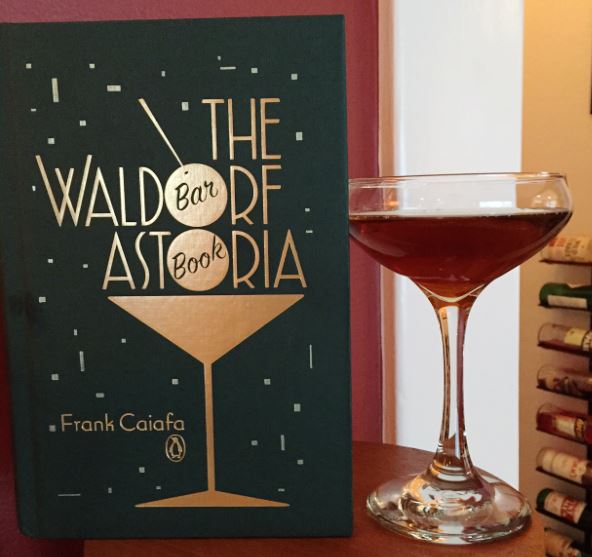
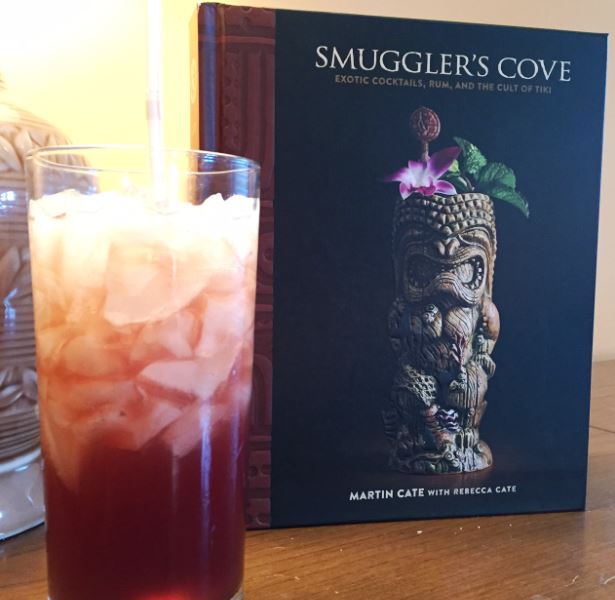
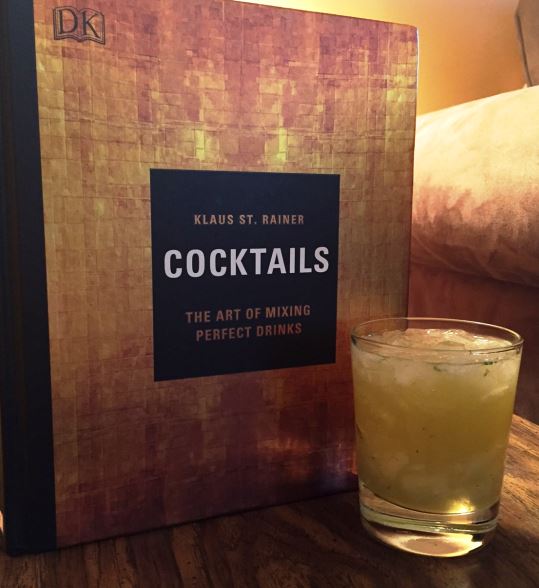



Mental Floss explored "how long it took 30 writers to finish their famous novels"--a range of two and a half days to 16 years.
---
Headline of the day: "Belgians are hunting books, instead of Pokemon," Reuters reported.
---
Colombia has put its new 50,000-peso bill into circulation, featuring two images of the country's beloved "Gabo," Gabriel García Márquez, Electric Lit reported.
---
Brightly shared "9 fun ways to keep kids interested in reading and storytelling."
---
Fashion lit tips: Quirk Books showed "how to dress like a Victorian."
---
The Citybook bookshelf is a "modular bookcase, flexible and suitable to any space.... Modules are linked together by small magnets," Bookshelf noted.
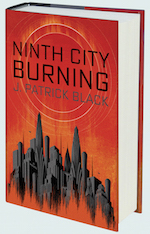

It has been 500 years since the apocalyptic Valentine's Day attack, when aliens wielding unimaginable powers descended on Earth and left mankind's cities in ruins. Humanity would have gone extinct were it not for its ability to harness a particular power, thelemity, a hitherto unknown universal force, like gravity or electromagnetism, but with properties more akin to magic than science. By using thelemity, mankind repelled the attacking Valentines, as the aliens came to be called, and fought them back through a network of dimensional portals. There the battle ground to a halt and became a centuries-long war of attrition.
What was left of humanity reorganized itself into the Principate, a series of 12 grand, thelemity-powered cities spread across the globe. These essentially military dictatorships each maintain a Legion whose members fight at the Front, many dimensions away, and protect Earth from sporadic Valentine raids. Each Principate also rules hundreds of settlements, whose residents are kept in the dark about thelemity yet are still forced to provide supplies and conscripts for the war effort. In the wilds of Earth, beyond the bounds of the settlements, roam the unincorporated peoples, barbarians and nomads separated entirely from the ongoing struggle for humanity's future.
As a lifelong resident of Ninth City, 12-year-old Jax is familiar with the wonders of thelemity. But his life has just gotten complicated. Jax returns to his classes at the School of Rhetoric having discovered he's a fontanus, a source of thelemity, with a one-in-many-millions ability that makes him an essential part of the world's survival. The first demonstration of his new status comes quickly, when Jax is called upon to power Ninth City's colossal defense guns during a Valentine raid. Should the attackers overcome the Ninth Legion and the City guns, Jax will be the only thing preventing immediate obliteration.
Out in the wilderness, Naomi, a girl Jax's age, and her older sister, Rae, seek a safe refuge for their nomadic tribe during the coming winter. Their tribe, or coda, are derided by those in settlements. But Naomi and Rae's group are more like wandering traders than the barbarous, semi-feral tribes like the Niagaras and Nworkies that threaten their well-being. Rae and the coda's other scouts look for trouble before it finds them. Naomi joins her sister on her first scouting mission, one that goes terribly wrong and casts the sisters into the wider word of thelemity and the Valentine War.
Torro is a young factory worker in Settlement 225, one of many hundreds of generic outposts belonging to the Ninth Principate. He works 16-hour shifts in a fish factory, canning supplies to send on to the "Prips" for the war effort. There is no thelemity at work here. Torro and his friends use old-fashioned technology and manual labor to keep the factories running. Yet the settlements are still expected to supply recruits alongside their other quotas, and when an extra round of drafts is ordered in S-225, Torro and his group of childhood friends are torn apart, with some sent off to join the Legion, from which past draftees have never returned.
Jax, Naomi, Rae and Torro's stories, told from their own first-person perspectives, become integral to the future of humanity, the Principate and the Valentine War. J. Patrick Black weaves them together masterfully in a novel that defies categorization as either science fiction or fantasy. Instead, Ninth City Burning is the best of both genres. Thelemity is as dazzling as magic from the best fantasy books, with rules and practical applications of high technology from the best science fiction.
Black's characters understand thelemity differently based on their life experiences, which is part of what makes his novel so compelling--each character's viewpoint is written in an utterly individual voice, with their own lexicons and attitudes. For Naomi and Rae, thelemity is like magic from the folktales they heard growing up. The sisters make excellent stand-ins for the reader, allowing for natural world-building. Torro uses the slang of an unsophisticated factory worker, and Jax, while comfortable with the "magic" all around him, is still only 12, and struggles with the burden of being fontani, responsible for the fate of his city. A handful of characters introduced later in the novel, especially Officer Aspirant Kizabel, give more depth to thelemity once its fundamental properties are introduced. Her chapters, as befitting her position as an engineer of thelemity, have footnotes like the scatterbrained scrawling of the mad (but lovable) genius she is.
All of these complex systems are layered into the story with care and never overwhelm. Beyond how thelemity operates in everyday life, its use in combat is another feat of literary ingenuity. The actual fighting is dazzling, savage, dizzying--all-around enthralling. Readers will care about these characters, and the stakes they fight for could not be higher. Ninth City Burning is a stunning work of fiction. --Tobias Mutter
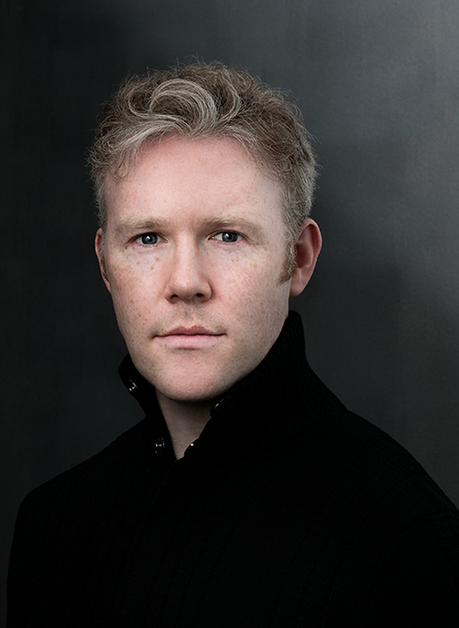 |
|
| photo: Beowulf Sheehan | |
Ninth City Burning is a thrilling, genre-busting debut novel from Boston-based author J. Patrick Black. While he's written other long-form fiction in the past, this is the first published novel, part of a planned series. His résumé is incredibly varied--bartender, lifeguard, small-town lawyer, costumed theme park character--and he currently builds homes. Ninth City Burning could change all that, though, with its fast pace, unique world-building and endearing characters.
You've really succeeded in mixing science fiction with fantasy. It's disorienting as hell at first, which is great. What kinds of inspiration did you draw from to build this story and this world?
There were a lot of influences from all of my favorite fantasy and science fiction stories. I really loved Orson Scott Card's Ender's Game, which you could probably get a little bit of from my story. I won't say I'd given up on fantasy for a while, but I'd become less interested in it until I got into George R.R. Martin's stuff, and that was a revelation for me. It made me think there were things you could do with fantasy and stories that I hadn't contemplated before
It really started with the younger characters in my story and grew from there. I was trying to think of a way that would end up with them getting thrown into this terrible multi-reality spinning conflict. The idea of thelemity, the magical force in Ninth City Burning, was just what came up. I wanted a reason for them to need to be there, aside from just the world being terrible. I've read books like that, and they're great in their own way, but they're very grim. I can only take so much grimness in one sitting.
The idea of thelemity almost scienticizes--scientificates? I had to make up a word--magic.
Yes.
How does that work?
There's an often-quoted saying from Arthur C. Clarke: "Any sufficiently advanced technology is indistinguishable from magic."
I was approaching it in the opposite way. Magic, if you explain or study it enough, seems like science. I wanted to take a fantastical concept and approach it from the opposite direction for people to whom it's new. I wanted to think about how people like you and me in our present society would react if they just suddenly found this force to exist. What would we do with it? My answer was, we would try to figure it out. We've had our scientific method ever since the Renaissance. I thought we would try to use that to understand what was going on. What we were presented with. It resulted in a nice kind of friction for me to have--to use science to understand something that is, at its base, not terribly scientific.
At the beginning of the novel, there are very strict social groups and environments. By the end of the novel, it's "We've got to bring everyone together behind this war effort." What were you trying to say with that?
I don't want to call it a culture of deception, but I can't think of a better word for it. You have the ruling society that's decided, for some reason, for the purposes of resource or control or whatever, that most of society has to be kept in the dark about what's actually happening. I had these younger characters who were a little bit more idealistic and thought that wasn't the way to do things. The basic idea is that when you're trying to conceal things from the majority of society, it's not going to work as well or efficiently. The war in this story is not a complex, modern war. It's all or nothing, obliteration or survival. Part of what's going on over the course of the story is the entire society being pushed to the point where they end up with the choice of either dispensing with those social artifacts or going extinct. It seems like that's the only point they would actually do it.
You've got an amazing career history--bartender, lifeguard, small time lawyer, home builder, theme park character. We've got to hear about that.
I've done all of those things without really traveling very far from home, too. The theme park character was actually one of the earlier things in my career. I was the red Power Ranger at--do you remember the Discovery Zone?
Oh, yes.
I worked at a knock-off one of those.
That is so full of win.
I was a red Power Ranger with a gigantic head. If you are trying to imagine the profession in which you are most likely to be punched in the groin, that is it. That is speaking also as a lawyer. It was a high school job. Lifeguarding was a high school job also. I started writing in college and then had the misfortune of going to law school.
What was behind that decision?
I was an English major.
So you couldn't make any money.
Yes. Reading and writing has a few broad applications, but in terms of a professional life, it's not a vocational path unless you really want to find your own niche--which a lot of people do these days, and it's really impressive. For me, it took a long time. Part of that was going to law school. That was where I developed my writer's lifestyle, which was to push all of my normal work as much as I can into one section of the day, and then write the rest of the time. As it turns out, if you're willing to wake up really early in the morning or stay up very late at night, you can balance an aspiring writing career and a legal career to some extent. I worked for a while with the DA's office in Barnstable, on Cape Cod. That was unique. That's maybe the best way to describe it.
How so?
I don't know how much you know about Cape Cod, but it's a resort area. During the winter, things get pretty bleak, so there aren't a lot of things for people to do except get arrested for drunk driving. Then, in the summertime, there would be a host of misbehaving summer kids and their disapproving parents. Then you would have the people who came from other countries to work as painters, landscapers, etc., who would show up because they got pulled over and they didn't have a license because they couldn't get one in the country. There was this whole weird spectrum of dereliction from all across the social spectrum.
What's next? Are you almost done with the second novel?
"Almost" may be stretching it a bit. I am working on the second novel. I was doing that just before we starting talking today. It seems to be moving right along. I've actually got a whole series planned out. I'm hoping I get the chance to write all of those, but I've got that novel going. I've got ideas for lots of other ones, but at this point, it's all about finding the time to get it all done. --Rob LeFebvre
Shelf vetted, publisher supported.
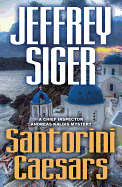
Jeffrey Siger's Andreas Kaldis series often depicts outrageous events that seem surprisingly plausible given the political morass that is modern Greece. The events in Santorini Caesars are no different. A young protestor is shot and killed by the police, and Athens is in an uproar--the death acting as the match to the tinder of immigration arguments and economic disasters that have plagued Greece in recent years.
Chief Inspector Andreas Kaldis soon discovers that the killers may not have been police, but rather military professionals in disguise, especially considering that the victim was the daughter of a high-ranking Greek military official. Convinced that something nefarious is afoot, when Kaldis hears a rumor that a group of military officials who call themselves "the Caesars" are planning a secret meeting on the island of Santorini, he's sure that a coup is in the works. He and his team set to work eavesdropping on the Caesars, trying to figure out their connection to the dead girl, and to the future of Greece.
Jeffrey Siger (Devil of Delphi) has perfected a blend of humorous interludes and shocking political conspiracy. The situations that Kaldis and his team face are all too believable, and their race to save their country will keep readers on the edge of their seats, while chuckling at the antics of Kaldis's temperamental secretary. Part of a series not to be missed, Santorini Caesars is a very appealing mystery with a delightful setting. --Jessica Howard, blogger at Quirky Bookworm
Discover: Political conspiracy abounds on one of Greece's most beautiful islands as Chief Inspector Andreas Kaldis tries to stop a potential military coup.
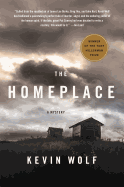
Discover: A basketball star goes back to his tiny hometown and is caught up in the investigation of a series of murders.
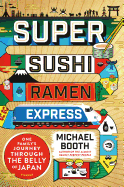
Not every food writer is willing to massage a cow. But British journalist Michael Booth (The Almost Nearly Perfect People), who has built his career traveling and writing about food and culture with a distinctive, humorous touch, does so happily in Super Sushi Ramen Express: One Family's Journey Through the Belly of Japan.
With his wife and two children, Booth spends three months exploring the country and studying the Japanese diet to learn about the longevity it has boasted. In big cities and small towns, he interviews a varied cast of experts, including food scientists, sumo wrestlers, wasabi growers, fishmongers and beef farmers. He even gains access to restaurants and industries often inaccessible to tourists.
Booth's witty prose radiates excitement even when detailing the fundamentals of soy sauce fermentation or the "bewildering" variety of Japanese noodles. Never pretentious, he exhibits equal parts curiosity and reverence at every gastronomic echelon, enjoying high cuisine one day, street food the next. Many pages yield both salivation and belly laughs. The Le Cordon Bleu-educated Booth, who has cooked in a Michelin-starred Paris restaurant, is not above describing a sauce as "gloopy."
Yet he also writes eloquently of mortality, savoring moments as well as tastes. Early on, he attends a tea ceremony. The host notices Booth's rapt attention, remarking, "You should cherish this moment. The Japanese have a phrase for making the most of fleeting encounters: ichigo ichie. It means 'one encounter, one chance.' " Whether or not Super Sushi Ramen Express is readers' first encounter with Japanese cuisine and culture, it is worth savoring. --Katie Weed, freelance writer and reviewer
Discover: Food writer and humorist Michael Booth sets his sights on Japanese cuisine, with delightful and delicious results.
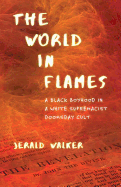
The Worldwide Church of God taught that the Great Tribulation would begin in 1972 and end three years later in a river of fire from which only the Chosen Ones would be saved. Jerald Walker grew up with these teachings looming over his head. In 1975, at the predicted end of the world, he would be 11 years old. In The World in Flames, Walker relates his unusual upbringing in Chicago as the sixth child of blind African American parents, in the black wing of a church that preached segregation as well as fire and brimstone.
Except for a brief prologue and epilogue offering a glimpse of the adult Walker, the whole of this fantastical true story is told from a child's disarming perspective. Jerry is six when his memoir opens in 1970, and his days are filled with fear. Preoccupied with the coming events and concern for a friend who is not Chosen, he struggles to navigate family secrets, severe corporal punishment and a religion based on threats. As narrator, Jerry is matter-of-fact and innocent about the improbability of his home life. This narrative voice renders an incredible story accessible. Perhaps the most heartbreaking detail is Jerry's guileless devotion to his church.
Walker (Street Shadows) recounts his growth from wide-eyed child to hapless teen, and finally to skeptic, with immediacy and feeling and without offering judgments. His personal history verges on the absurd, but his telling of it is earnest and unadorned, never sensational. The World in Flames is a difficult story simply and gracefully told. --Julia Jenkins, librarian and blogger at pagesofjulia
Discover: This vivid, immersive memoir describes an innocent childhood in a terrifying religion.
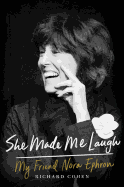
Early in Washington Post columnist Richard Cohen's intimate, affectionate and engaging memoir of Nora Ephron, he reveals the problem with writing about her life and their 39-year friendship: "Nora wrote about everything. She not only chronicled her life, she consumed all the best material, leaving nothing but cinders for a biographer to sift through." Fans of the filmmaker (Sleepless in Seattle, When Harry Met Sally) and author (I Feel Bad About My Neck) need not worry; Cohen's She Made Me Laugh expands and enriches Ephron's familiar anecdotes by retelling them with a keen, questioning eye and adds new personal tales and insights.
The eldest daughter of two alcoholic Hollywood screenwriters, Ephron moved to New York City in the early 1960s to become a writer. Soon, she was writing for Esquire, Ms. and the New York Times. She turned her very public marital breakup (with second husband Carl Bernstein) into the comic revenge novel Heartburn. Calling Ephron "a deft literary pickpocket," Cohen recalls how everything in her life was fair game for an article, screenplay or blog post--except her six-year battle with leukemia. Outside of her immediate family, Cohen was one of the few people she trusted with her cancer secret. (His longtime companion, Mona Ackerman, was also battling cancer at the time and died two months after Ephron in 2012.)
Cohen's heartfelt tribute gives fans new insight into her work process, her successes and failures, her droll wit and enormous generosity, and her decision to keep her final illness out of public view. --Kevin Howell, independent reviewer and marketing consultant
Discover: Richard Cohen celebrates his friendship with writer/filmmaker Nora Ephron while offering keen insights into her personal and professional life.
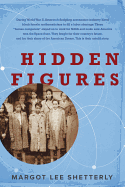
Before "computer" meant a sophisticated calculating machine, it meant a person: someone with a firm grasp of numbers and their myriad practical applications. In the 1940s, as the U.S. rapidly expanded its flight program to fight the Axis powers, the Langley Memorial Aeronautical Laboratory in Virginia tapped a new source of computing strength: a group of highly educated African American women. For the next two decades, these computers applied their mathematical knowledge to solve problems of flight at Langley. Margot Lee Shetterly tells the previously unknown story of these women in her first book, Hidden Figures: The American Dream and the Untold Story of the Black Women Mathematicians Who Helped Win the Space Race.
The daughter of a NASA engineer, Shetterly grew up believing that math and science careers were simply a smart choice for black people. But for Dorothy Vaughan, Katherine Goble Johnson, Mary Jackson and many other women, the computing pool at Langley offered a chance to break out of traditional "black jobs" and into a new world. Spending their days working alongside top-notch engineers and helping launch airplanes (and later rockets) into flight was intoxicating, but they still had to fight for every bit of recognition they received. Shetterly weaves their stories with a fraught narrative of racial and gender politics in the U.S. in the mid-20th century. Drawing on extensive oral interviews and other records, Shetterly brings her subjects to life, highlighting both their pioneering mathematical work and their struggles to be taken seriously as professionals. Meticulous research + engaging writing + fantastic real-life characters = a brilliant launch. --Katie Noah Gibson, blogger at Cakes, Tea and Dreams
Discover: The untold story of NASA's brilliant black female mathematicians comes to life in Margot Lee Shetterly's debut, soon to be a major motion picture.
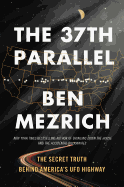
Most people have hobbies, and Chuck Zukowski, part-time microchip engineer and volunteer sheriff's deputy, is no different. His hobby--turned near obsession--consists of collecting data and evidence on the possibility that aliens visit and inhabit the earth on a regular basis, earning him the nickname "the Mulder of El Paso."
For more than 20 years, Zukowski has collected information and conducted onsite investigations into mysterious sightings of lights in the night sky; hundreds of exsanguinated and bizarrely mutilated cattle and horses; natural geological disturbances; and pranks, hoaxes and mistaken identities. Ben Mezrich, author of The Accidental Billionaires, brings Zukoswki's story of UFOs and dead livestock into the mainstream, allowing readers a look at the incredible amount of evidence that exists to substantiate the idea that we are not alone in the universe.
Case by case--Roswell, Area 51, cattle ranches across the Southwest--Mezrich puts readers in Zukowski's shoes, sharing his excitement and adrenaline rushes, and the fears, frustration and anger that have accompanied the task of investigating events that most people don't believe happened. He includes Zukowski's dealings with the Mutual UFO Network, the Bigelow Aerospace company and its founder, a fellow UFO believer, and Zukowski and his sister's nerve-wracking encounters with government officials in black SUVs. Whether you believe in UFOs or not, Mezrich's professional and entertaining approach to a semi-taboo subject will have readers shaking their heads and checking the night sky for any unusual sights or sounds. --Lee E. Cart, freelance writer and book reviewer
Discover: One man's rich trail of data, accumulated over two decades, that suggests aliens exist and visit Earth on a regular basis.
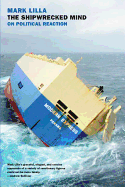
In 2016, white nativists are out in force in the United States, having seized control of a major political party; radical Islamists are influencing global politics and occupying significant swaths of North Africa and the Middle East; Britain is exiting the European Union; and tsarists are resurgent in Russia. In The Shipwrecked Mind: On Political Reaction, Mark Lilla traces the intellectual roots of these developments. Lilla argues that the revolutionary has been thoroughly analyzed, but that academia has all but ignored its opposite, the reactionary. Shipwrecked is a successful first step in rectifying this absence.
The revolutionary is optimistic, perhaps utopian, looking to rip apart the past to build a better future. The reactionary dreams of a golden-aged past and seeks to restore it, whether that is a 1950s United States or an Islamic caliphate from the 6th century. Lilla accurately notes this affinity, "from the radical nativist on the far right to radical Islamists--who despise the present and dream of stepping back in history to recover what they imagine was lost." Reactionaries are fixated on political nostalgia based upon myth. The world was never the way it is in their fantasies, any more than the world can be shaped into the utopia of the revolutionary.
Shipwrecked is an important work. It is accessible, even for the non-scholarly reader, and critical in helping explicate the current global political environment. It also contains one of the most astute readings of Michel Houellebecq's Submission; for that alone it deserves consideration. --Evan M. Anderson, collection development librarian, Kirkendall Public Library, Ankeny, Iowa.
Discover: The Shipwrecked Mind adroitly analyzes the intellectual underpinnings of right-wing ideology and explains the present political climate.
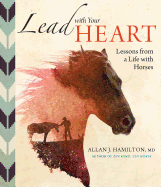
Allan J. Hamilton is a respected neurosurgeon who has spent more than 25 years "working inside the human brain with a scalpel," while also sharing his life with and training horses. Lead with Your Heart focuses on what horses have taught him--truths that have inspired Hamilton to apply what he's learned to the universal context of life in order to become a better person.
"The horse's greatest gift," says Hamilton (Zen Mind, Zen Horse) is teaching us how to "reestablish our unity with the world around us." Through grooming manes and picking hooves, Hamilton was motivated to look upon the lives of equines through a philosophical prism because "the simplest acts can engender the greatest insights." The nature of horses--animals who instinctively yearn for harmony, peace, kindness, leadership, kinship and trust--is an apt metaphor for the human condition. Through a series of clear and concise essays--some are only a paragraph in length--Hamilton conveys meticulous observations and axioms like "drop the reins," "circle for safety" and "horses don't lie, people do." Simple yet detailed examples and ideas, about teaching and learning, leading and following, searching for happiness and sampling different emotional energies, aim toward self-revelation and cultivating a more meaningful life. Quotes from Sartre, Whitman, Shakespeare and others--along with exquisite illustrations by Róbert Farkas--provide additional inspiration.
These reflective, insightful meditations will encourage readers--and not just horse lovers--to be mindful and vigilant about their responses and behaviors, while probing a higher consciousness. --Kathleen Gerard, blogger at Reading Between the Lines
Discover: Inspirational essays illustrate how the nature of horses can lead humans on a path toward personal enlightenment.
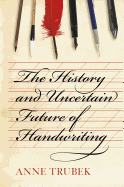
In The History and Uncertain Future of Handwriting, Anne Trubek (A Skeptic's Guide to Writers' Houses) explores the development of handwriting--physical and cultural--from clay tablets and cuneiform in ancient Mesopotamia to its role in the world of digital communication.
Trubek describes changes in the technology of handwriting. (Making a quill pen is more complicated than you may realize.) More importantly, she considers the political and social implications inherent in who learned to write, what they recorded and the scripts they used. She traces the relatively late rise of the notion that a person's handwriting is an unusual production, and ties the idea that handwriting is a reflection of personality to pseudosciences such as phrenology and eugenics.
Some of the most interesting sections arise from the recurring fear that innovations in writing technologies, such as the printing press and the typewriter that threatened to replace it, would prove detrimental to the intellectual abilities of future generations embracing them. Handwriting itself was the target of impassioned attacks by Socrates and his followers, who believed the written word would destroy not only the ability to remember but also the ability to think complex thoughts.
Trubek never loses sight of the fact that handwriting is a controversial subject today. Throughout her history, she offers amusing and insightful comparisons between past and present, preparing the reader for a final discussion of the future of handwriting. The result is a light-handed and thoughtful account of a complicated subject. --Pamela Toler, blogging at History in the Margins
Discover: The rise and fall of handwriting may not spell the end of civilization.
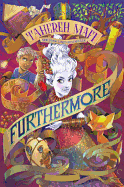
Alice Queensmeadow was born "white as milk"--without any pigment--in Ferenwood, where color is magic and reigns supreme.
As "smart and lively and passionate" as 12-year-old Alice is, she doesn't make sense to anyone in Ferenwood. In this fantastical world where people are as bright as planets, Alice feels alone, even with her green-haired, brown-skinned mother whom she loves, but can't really like, "a prune of a person" who is constantly threatening her with outlandish punishments like "whisking" her into an elephant. It didn't matter as much before Alice's beloved father abandoned her and her triplet brothers about three years ago, but when he left, "[t]he shock of loss unlatched her armor, and soon cold winds and whispers of fear snuck through the cracks in her skin...."
Alice careens wildly between brooding and optimism. Often she is full of joy, almost Pan-like. Her beaded, bejeweled clothes exhaust her, so she frequently removes them. She eats flowers without honey because she wants to taste them "unmasked," the taste of truth. She loves her body, "her favorite thing she ever owned," and dancing, "her ticket to greatness." In darker moments, she mourns her father and loathes 13-year-old Oliver Newbanks, her childhood nemesis who called her ugly. Alice's only hope of escaping her lonely existence is to win the Surrender, a contest that promises a way out of Ferenwood, adventure, maybe even a way to her father. With its fascinating heroine, companionable narrator, wit and Oz-like world-building, Furthermore by Tahereh Mafi (Shatter Me; Unravel Me; Ignite Me) is a surprising, sensuous, delicious fantasy to devour like Alice devours flowers. --Karin Snelson, children's & YA editor, Shelf Awareness
Discover: In Tahereh Mafi's middle-grade fantasy, a girl born without pigment tries to find her way in a realm where color is everything.
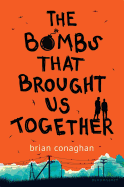
Some time, somewhere, Little Town and Old Country are separated by borders and bombs. If Little Town is said to be filthy, broke and run by ragtag criminals, Old Country is conformist, rich and militaristic. Almost 15, cautious "Little Towner" Charlie Law stays relatively safe by making his own laws, above and beyond adhering to those imposed by the warring Regimes and Governments. His appealingly spirited personality and occasional snarky outbursts, however, hint at the rebel within.
Despite closed borders, an Old Country refugee family arrives in Little Town. Their son Pavel Duda--frightened yet foolhardy--quickly becomes Charlie's best friend. The boys ambitiously plan to turn a small backyard shed into a clubhouse, risking contact with the lawless "Big Man" who promises the needed furniture--and more. But at what cost? As school resumes, Pavel's awkwardness with the local "lingo" makes him an easy target among his less-than-welcoming classmates. Being Pavel's guide and protector is tough enough, but Charlie also needs to avoid both the threatening Little Town Rascals and Old Country troops. While navigating the dangers of school halls and deserted streets, he's desperately falling in first-love and trying to save his mother's life.
The Bombs That Brought Us Together--Scottish-born, Dublin-domiciled Brian Conaghan's timely follow-up to his Carnegie Medal-nominated When Mr. Dog Bites--is a nuanced examination of right and wrong, the unreliability of labels and the choices people are forced to make in uncertain times. He effectively showcases the indomitable power of humanity: even as bombs destroy, they can also bring out the best in those who survive and eventually thrive. --Terry Hong, Smithsonian BookDragon
Discover: Two teens who should have been wartime enemies find that true friendship is the best path to survival.
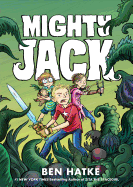
Ben Hatke's (Little Robot; Zita the Spacegirl trilogy) cinematic graphic novel Mighty Jack uproots and replants the Jack and the Beanstalk story and it grows into something mighty indeed.
It's finally summertime, but Jack's mom is about to start working two jobs, so it will be Jack's job to take care of his autistic little sister, Maddy, day and night. On their last summer day together, they drive to the flea market where Jack, terrifyingly, loses his sister while his mom is busy buying tools. He finds Maddy hanging out with a devilish-looking man with a latched wooden box full of seed packets: "Plant these seeds, and I promise you--freedom," he says. Maddy, who usually doesn't speak, pleads, "Buy the seeds, Jack. Buy all the seeds." Jack doesn't have enough cash, so he gives the guy his mother's car keys. "YOU DID WHAT?!?" his mom says, calling 911.
Obsessed, Maddy starts digging a garden right away. The seeds grow fast, and they grow weirdly. Creepy green hands reach up to the moon, and soon the kids have the most bizarre, dangerous, explosive, prehistoric-looking garden ever, including plants that hurl dirt clods and chase the siblings hungrily. When a sword-wielding neighborhood girl named Lilly joins ranks with them to fend off the violent garden, Jack gets all moony over her. As friendship blossoms, Maddy does, too, finding her voice in the belligerent, otherworldly garden. Told with sensitivity, illustrated with panache, this high-action series debut soars. --Karin Snelson, children's & YA editor, Shelf Awareness
Discover: In Ben Hatke's contemporary graphic-novel spin on Jack and the Beanstalk, Jack and his autistic sister Maddy get more than they bargained for when they trade their mom's car for some magical seeds.